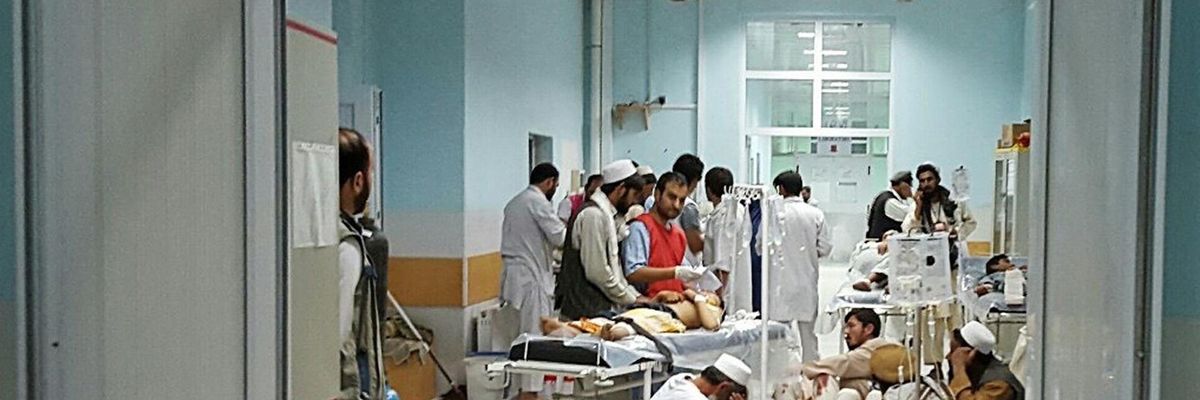On October 3, a US airstrike destroyed a Medecins Sans Frontieres (also known as Doctors Without Borders) hospital in Kunduz, Afghanistan, killing 22 healthcare workers and patients. On October 6, the commander of US armed forces in Afghanistan, General John Campbell, told the US Senate Armed Services committee that the attack had been an accident. With CODEPINK protesters covered in fake 'blood' in the background, Campbell assured the committee that the Pentagon was carrying out its own investigation that would be "thorough, objective and transparent."
But Doctors Without Borders isn't buying it. The group says that the official stories from the US military and the Afghan government changed four times in four days, from "collateral damage" to accidental bombing to charges that Taliban fighters were using the hospital as a base of operations, a claim the aid group strongly disputed. The facility was the only free trauma care hospital in northern Afghanistan treating 22,000 and performing more than 5,900 surgical procedures in 2014.
On October 7, President Obama issued a formal apology for the attack. While Doctors without Borders recognized Obama's apology, it insisted that an apology was not enough, since 22 people were killed and 300,000 people are now deprived of surgical and medical care in the Kunduz province. Doctors Without Borders also recognizes that this is about the larger issue of respect for the Geneva Conventions, which is supposed to ensure protection for humanitarian groups providing life-saving services in conflict zones. Hospitals have been attacked in many countries, including Yemen, Sudan, Syria, Gaza, and Egypt, so holding the US accountable in this case could have a much wider impact.
Thus Doctors Without Borders calls for an independent investigation by the International Humanitarian Fact-Finding Commission, a body that was actually created in 1991 to investigate violations of international humanitarian law but has never been activated. Dr Joanne Liu, president of Doctors Without Borders, says "the tool exists, and it is time it is activated." The Commission has said it is ready to undertake an investigation, but it can only open an inquiry with the consent of the international community. The request to activate the Commission has to come from one of the 76 countries that recognize the Commission (neither the US nor Afghanistan are a part of this), and then all parties to the conflict must agree for the investigation to go forward.
The US, NATO, and the Afghan government all say they are conducting their own investigations into the attack, but only an independent investigation can uncover the facts we need to demand accountability and new safeguards to ensure this type of tragedy doesn't happen again. The Pentagon balks at the idea of an outside investigation, and some Republican lawmakers have publicly ridiculed the notion of an international body taking on the task. International pressure will be key to getting the US government to submit to an impartial and transparent probe into the issue.
On October 10, the Pentagon said in a statement that it would make "condolence payments to civilian non-combatants injured, and the families of civilian non-combatants injured as a result of US military operations." The Pentagon also said it would make payments to repair the hospital, although it was unclear who they would be making payments to, since Doctors Without Borders does not accept government money for its work in conflict zones.
But more is needed. The bombing should also be a moment to reflect on the 14 years of US intervention in Afghanistan. This intervention has cost the lives of 2,350 US servicemen and women, plus the lives of thousands of Afghans and service members from our NATO partners. It has cost US taxpayers over a trillion dollars, money that could have made an enormous difference funding vital domestic needs.
And what do we have to show for it? Despite 14 years of US involvement at an estimated cost of $33,000 for every man, woman and child in Afghanistan (or $14 million per hour since 9/11, according to one study), Afghanistan remains mired in poverty, corruption and political strife. Despite the massive amount of effort spent on women's empowerment, Afghanistan remains a deeply misogynist culture where only 17% of women can read and write. Despite the vast resources invested in training and equipping the Afghan army, Afghan soldiers have not been able rout the Taliban, and General Campbell himself has admitted that the Afghan police and military--which receive over 90 percent of their funding from US taxpayer dollars--are totally unsustainable.
The American people have long soured on continued military involvement in Afghanistan. Responding to public sentiment, President Obama promised to cut the current force of 10,000 US troops in half by 2016. In March, however, the president announced he would slow the pace of troop withdrawal and now - with the resurgence of the Taliban - there is a call by many Congressional representatives to keep the troops there for years to come. There is even talk of sending more troops.
But more troops, and the continued presence of existing US forces, will only ensure a continuation of the conflict. The Kunduz bombing is really a symptom of the underlying disease: foreign occupation. Yes, we must press for an independent investigation of the bombing, for this might help protect hospitals and clinics in all conflict zones. But in Afghanistan, the best way to ensure that the US military will not bomb any more civilian targets is for President Obama keep to the timeline of withdrawing US troops by the end of 2016. The US military presence will not create long-term peace and stability in Afghanistan. On the contrary: as long as US troops are there, militants will fight to oust them. The ills afflicting the Afghan people require a political solution that includes the withdrawal of all foreign forces. That, indeed, is the only long-term cure.
